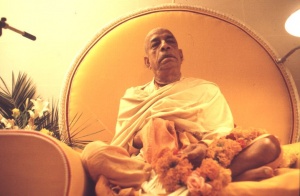SB 10.5.8: Difference between revisions
m (1 revision(s)) |
(Vanibot #0054 edit - transform synonyms into clickable links, which search similar occurrences) |
||
| (One intermediate revision by one other user not shown) | |||
| Line 1: | Line 1: | ||
{{info | {{info | ||
|speaker= | |speaker=Śukadeva Gosvāmī | ||
|listener=King | |listener=King Parīkṣit | ||
}} | }} | ||
[[Category:Srimad-Bhagavatam - Canto 10 Chapter 05|s08 ]] | |||
[[Category:Bhagavatam Verses Spoken by Sukadeva Gosvami - Vanisource|100508]] | |||
<div style="float:left">'''[[Srimad-Bhagavatam]] - [[SB 10|Tenth Canto]] - [[SB 10.5: The Meeting of Nanda Maharaja and Vasudeva|Chapter 5: The Meeting of Nanda Mahārāja and Vasudeva]]'''</div> | |||
<div style="float:right">[[File:Go-previous.png|link=SB 10.5.7]] '''[[SB 10.5.7]] - [[SB 10.5.9]]''' [[File:Go-next.png|link=SB 10.5.9]]</div> | |||
{{RandomImage}} | |||
==== TEXT 8 ==== | ==== TEXT 8 ==== | ||
<div | <div class="verse"> | ||
mahārha-vastrābharaṇa- | :mahārha-vastrābharaṇa- | ||
kañcukoṣṇīṣa-bhūṣitāḥ | :kañcukoṣṇīṣa-bhūṣitāḥ | ||
gopāḥ samāyayū rājan | :gopāḥ samāyayū rājan | ||
nānopāyana-pāṇayaḥ | :nānopāyana-pāṇayaḥ | ||
</div> | </div> | ||
| Line 17: | Line 22: | ||
==== SYNONYMS ==== | ==== SYNONYMS ==== | ||
<div | <div class="synonyms"> | ||
mahā- | ''[//vanipedia.org/wiki/Special:VaniSearch?s=mahā&tab=syno_o&ds=1 mahā]-[//vanipedia.org/wiki/Special:VaniSearch?s=arha&tab=syno_o&ds=1 arha]'' — extremely valuable; ''[//vanipedia.org/wiki/Special:VaniSearch?s=vastra&tab=syno_o&ds=1 vastra]-[//vanipedia.org/wiki/Special:VaniSearch?s=ābharaṇa&tab=syno_o&ds=1 ābharaṇa]'' — with garments and ornaments; ''[//vanipedia.org/wiki/Special:VaniSearch?s=kañcuka&tab=syno_o&ds=1 kañcuka]'' — by a particular type of garment used in Vṛndāvana; ''[//vanipedia.org/wiki/Special:VaniSearch?s=uṣṇīṣa&tab=syno_o&ds=1 uṣṇīṣa]'' — with turbans; ''[//vanipedia.org/wiki/Special:VaniSearch?s=bhūṣitāḥ&tab=syno_o&ds=1 bhūṣitāḥ]'' — being nicely dressed; ''[//vanipedia.org/wiki/Special:VaniSearch?s=gopāḥ&tab=syno_o&ds=1 gopāḥ]'' — all the cowherd men; ''[//vanipedia.org/wiki/Special:VaniSearch?s=samāyayuḥ&tab=syno_o&ds=1 samāyayuḥ]'' — came there; ''[//vanipedia.org/wiki/Special:VaniSearch?s=rājan&tab=syno_o&ds=1 rājan]'' — O King (Mahārāja Parīkṣit); ''[//vanipedia.org/wiki/Special:VaniSearch?s=nānā&tab=syno_o&ds=1 nānā]'' — various; ''[//vanipedia.org/wiki/Special:VaniSearch?s=upāyana&tab=syno_o&ds=1 upāyana]'' — presentations; ''[//vanipedia.org/wiki/Special:VaniSearch?s=pāṇayaḥ&tab=syno_o&ds=1 pāṇayaḥ]'' — holding in their hands. | ||
</div> | </div> | ||
| Line 24: | Line 29: | ||
==== TRANSLATION ==== | ==== TRANSLATION ==== | ||
<div | <div class="translation"> | ||
O King Parīkṣit, the cowherd men dressed very opulently with valuable ornaments and garments such as coats and turbans. Decorated in this way and carrying various presentations in their hands, they approached the house of Nanda Mahārāja. | O King Parīkṣit, the cowherd men dressed very opulently with valuable ornaments and garments such as coats and turbans. Decorated in this way and carrying various presentations in their hands, they approached the house of Nanda Mahārāja. | ||
</div> | </div> | ||
| Line 31: | Line 36: | ||
==== PURPORT ==== | ==== PURPORT ==== | ||
<div | <div class="purport"> | ||
When we consider the past condition of the agriculturalist in the village, we can see how opulent he was, simply because of agricultural produce and protection of cows. At the present, however, agriculture having been neglected and cow protection given up, the agriculturalist is suffering pitiably and is dressed in a niggardly torn cloth. This is the distinction between the India of history and the India of the present day. By the atrocious activities of ugra-karma, how we are killing the opportunity of human civilization! | When we consider the past condition of the agriculturalist in the village, we can see how opulent he was, simply because of agricultural produce and protection of cows. At the present, however, agriculture having been neglected and cow protection given up, the agriculturalist is suffering pitiably and is dressed in a niggardly torn cloth. This is the distinction between the India of history and the India of the present day. By the atrocious activities of ''ugra-karma'', how we are killing the opportunity of human civilization! | ||
</div> | </div> | ||
__NOTOC__ | |||
<div style="float:right; clear:both;">[[File:Go-previous.png|link=SB 10.5.7]] '''[[SB 10.5.7]] - [[SB 10.5.9]]''' [[File:Go-next.png|link=SB 10.5.9]]</div> | |||
__NOTOC__ | |||
__NOEDITSECTION__ | |||
Latest revision as of 19:19, 17 February 2024

A.C. Bhaktivedanta Swami Prabhupada
TEXT 8
- mahārha-vastrābharaṇa-
- kañcukoṣṇīṣa-bhūṣitāḥ
- gopāḥ samāyayū rājan
- nānopāyana-pāṇayaḥ
SYNONYMS
mahā-arha — extremely valuable; vastra-ābharaṇa — with garments and ornaments; kañcuka — by a particular type of garment used in Vṛndāvana; uṣṇīṣa — with turbans; bhūṣitāḥ — being nicely dressed; gopāḥ — all the cowherd men; samāyayuḥ — came there; rājan — O King (Mahārāja Parīkṣit); nānā — various; upāyana — presentations; pāṇayaḥ — holding in their hands.
TRANSLATION
O King Parīkṣit, the cowherd men dressed very opulently with valuable ornaments and garments such as coats and turbans. Decorated in this way and carrying various presentations in their hands, they approached the house of Nanda Mahārāja.
PURPORT
When we consider the past condition of the agriculturalist in the village, we can see how opulent he was, simply because of agricultural produce and protection of cows. At the present, however, agriculture having been neglected and cow protection given up, the agriculturalist is suffering pitiably and is dressed in a niggardly torn cloth. This is the distinction between the India of history and the India of the present day. By the atrocious activities of ugra-karma, how we are killing the opportunity of human civilization!